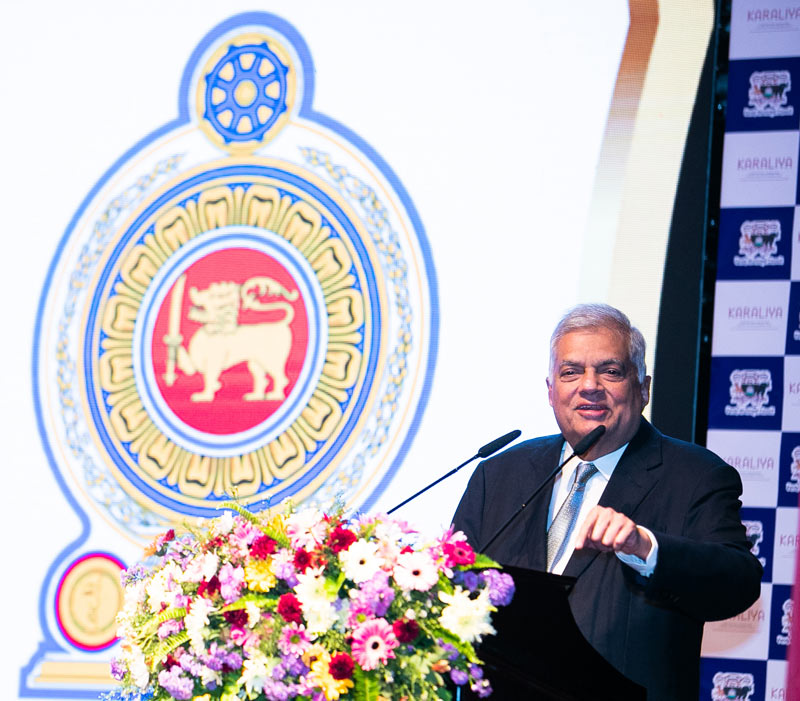Wednesday Feb 18, 2026
Wednesday Feb 18, 2026
Monday, 18 December 2023 01:40 - - {{hitsCtrl.values.hits}}

President Ranil Wickremesinghe yesterday urged all political leaders to exhibit responsibility in their approach to the International Monetary Fund (IMF) program.
He emphasised that those opposing the program should provide concrete proposals to rescue the country from financial crisis. The President cautioned against engaging in rhetoric merely for public appeasement without shouldering responsibilities, noting that such political tactics could lead the nation back into economic turmoil.
During a speech at the inauguration of the Karaliya Convention Centre and Performing Arts at Kandy Municipality, the President underscored that, despite facing blame and acknowledging the challenge of making tough decisions, individuals resorting to popular statements exhibit an unwillingness to take necessary measures.
Emphasising the absence of alternative options to salvage the country’s economy, he reiterated the initiation of the program with the IMF.
President also said Sri Lanka’s next step involves heading to London to engage in negotiations with private creditors.
“Successfully emerging from bankruptcy has paved the way for us to regain access to credit, facilitating the commencement of development initiatives in the near future. The upcoming year will witness a surge in development projects, marking a significant milestone achieved through agreements pertaining to loans from the IMF and other nations. We find ourselves in the position of demonstrating a minimum income to meet our country’s debt obligations. Despite the challenges, we have committed to moving forward,” the President said.
In his address President Wickremesinghe also made the following observations.
Our primary objective is to increase the Government revenue to GDP ratio by 10.4%, a target initially. The target set for 2024 may not be achievable; however, there is an expectation to reach this goal by 2025 or 2026. Recognising the need for flexibility, we engaged in negotiations with the IMF to revise the target to 9.2% for 2024. Although they indicated reluctance to further adjustments, our determination is unwavering and we are poised to achieve this revised goal.
If you were in my position, facing the dilemma of extending the timeline or achieving these goals by 2024, what would you choose? I firmly asserted that expediting these accomplishments is the priority.
Meeting the 2024 goal will leave us with a deficit of Rs. 534 billion in our income, a challenge we are steadfastly working to address.
The shortage we face is partly attributed to the Aswasuma project. We invested Rs. 61 billion in Samurdhi, but an allocation of Rs. 207 billion has been earmarked for Aswesuma relief, specifically for the underprivileged citizens of our nation. Additionally, the augmentation of Government employee salaries required an allocation of another Rs. 133 billion. It is essential to recognise that the Rs. 534 billion deficits is a result of vital investments. For three years, the country’s economy suffered a collapse without adequate capital expenditure, necessitating the infusion of funds into these crucial areas.
The IMF suggested that we should increase taxes. This presents an unbearable situation. While raising taxes may lead to a decrease in popularity, rescuing the economy is paramount to eliminating bankruptcy. Although there were options to increase various taxes, such as fuel taxes, it was recognised that such measures would have widespread repercussions across multiple sectors. When accounting for the cascading impact on electricity charges, the cumulative effect of raising the fuel tax becomes significantly more burdensome.
So we focused only on Value Added Tax (VAT). The VAT, which was 15%, was increased to 18%. Also, VAT was charged on those that were not currently VAT charged. In other countries, VAT is charged on all of them. Also, in India, the VAT rate is up to 23% while in Pakistan it is up to 18%. Their per capita income is lower than ours.
Hence, I made the difficult decision within the Cabinet. The Cabinet comprises individuals who will be seeking re-election in the next election and it is widely acknowledged that none of them favour tax increases. However, we realised that there was no alternative. The Government is steadfast in its commitment to pulling the country out of bankruptcy by 2024. Consequently, although met with reluctance, everyone in the Cabinet ultimately agreed, recognising that overcoming bankruptcy is essential for the progress of our nation.
Furthermore, what is our alternative? One option is to refrain from spending, but I find that impractical. I challenged others to propose an alternative, but no one has come forward with a viable solution.
Some experts and politicians suggest renegotiating with the IMF. However, this is a misleading proposition. The IMF is not a singular entity. We engaged in discussions with numerous countries, meeting with their leaders. Altering the terms now would mean our country must repay the debt anew. I am not in favour of such a scenario. It is crucial to ask the people if they are willing to return to bankruptcy or not.
Those opposing this should articulate alternative solutions if the program with the IMF is rejected. It is imperative to declare how we can generate revenue and navigate our way out of bankruptcy. This reflects a significant weakness in our political landscape, unwillingness to take responsibility and make challenging decisions. Mere attempts to please without contemplating the source of funds won’t suffice. This lack of foresight was evident last May when no one stepped up to shoulder the responsibility. Hence, I urge all political leaders to act responsibly in this matter.